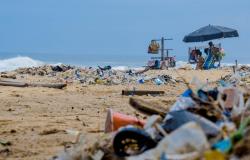A Plastics Treaty is Really About Fossil Fuels

Martha Molfetas argues that a just transition will require a solid plastics treaty.
Plastic Treaty meetings in Ottawa, Canada wrapped up with little fanfare and an agreement to come up with something this November in Busan, South Korea. It’s still possible for 2024 to bring us a binding global treaty that ends plastic pollution, but there are some pretty big voices pushing for continued use of plastics. Similar to COP28 and many recent global forums, fossil interests have come center stage during a global forum for the environment and our shared futures.
The old adage of ‘fish in the sea’ will likely need to be replaced with ‘plastic in the ocean’ by the middle of this century. Today, plastic is responsible for 4% of global emissions and 85% of marine waste. But a plastics treaty is about far more than waste management, it’s about cutting emissions and reducing reliance on fossil fuels. The majority of all plastic is created from fossil fuels through byproducts in the refining process. Without a treaty, each decade ahead will bring its own stark statistics. Plastic production will drive a 30% growth in demand for fossil fuels by 2030. By 2040, plastic production and waste will account for 19% of global emissions; for comparison aviation emissions account for 2% of global emissions today. If left to current trend lines, it’s anticipated that plastic production will triple by 2050. Achieving an agreement on plastic pollution and production could help achieve the promise of 1.5°C set out in the Paris Agreement, and align with COP28’s agreed phase out of fossil fuels by 2050.
During deliberations, G7 nations agreed to reduce plastic production and end plastic waste by 2040. On the whole negotiations oscillated between two future realities: one where we phase out plastics and address waste led by the High Ambition Coalition, and one where we focus efforts solely on recycling and removing harmful chemicals used in plastics manufacturing. Largely a reality where we continue to produce and use plastics—the business as usual folks. Between now and November, working groups will assess harmful plastics and decide on the types of financial mechanisms required to deal with plastic pollution. Russia, China, and petro-chemical interests ultimately drove down ambition in Ottawa—calling on recycling and circularity approaches over culling plastic production. That said, Ottawa gave us an important step from ideas towards potential future treaty language. Ultimately it will be what transpires between now and November that will determine both the question of plastic and fossil fuel reliance.
Shrink Wrapped Everything?
Plastics have become ubiquitous in our daily lives. That unfortunately means they’re ubiquitous in our waste. From direct emissions to ocean pollution and biodiversity impacts, and health impacts for us, there are numerous negative externalities tethered to plastic. Microplastics have been found everywhere from the wombs of expecting mothers and the ice atop mountain peaks.
Recycling alone will not fix this. Unlike paper and aluminum, plastic takes much more energy and technological effort to recycle and much more time to naturally break down. Unfortunately, many plastics are non-recyclable. Globally, only 9% of plastics are recycled, with 19% getting incinerated. The rest ends up in oceans and landfills where it emits greenhouse gasses and harmful chemicals as it breaks down into microplastics. Roughly 60 companies, primarily food and drink manufacturers, are responsible for half of global plastic pollution. This fact alone pushes against the notion that consumers are solely responsible and that recycling alone can solve this. Companies must seek alternatives and consider the full lifecycle of plastics in their value chains.
Petro-chemical interests also need to find alternative investments beyond plastics. As crude oil gets transformed into diesel, petroleum, and kerosene; it leaves in its wake a sludge of material waste that is incorporated into items that are a part of modern life—from single use plastics to asphalt and fertilizers. It’s in the interest of fossil fuel companies and aligned nations to continue to churn out plastics, despite the collective best interests for our oceans, air, and climate reality. In fact, Exxon Mobil recently invested $10 billion towards plastic manufacturing in China.
A just transition will require a solid plastics treaty. COP28 reinforced the signals demonstrated within the Paris Agreement—we must phase down fossil fuels and strive for a more sustainable future. Rather than diversify energy investments to increase production of renewables and meet this unique energy-climate moment, fossil interests are perpetuating plastics. Delaying the inevitable will create more collective harm. We can have a climate and environmental future that is sustainable and give ourselves and future generations a stable planet, but it will hinge on phasing out fossils from our lives.
Martha Molfetas is a Senior Fellow, Planetary Politics, at New America - working on just energy transition; and a Visiting Assistant Professor at Pratt Institute’s Graduate Center for Planning and the Environment; where she teaches Environmental Economics. Martha is a senior climate and energy policy consultant, writer, and strategist with over 15-years of experience helping NGOs, think tanks, and businesses unpack climate, environmental justice, resource conflict, sustainable development, and global policy issues.
Photo by Lucien Wanda


